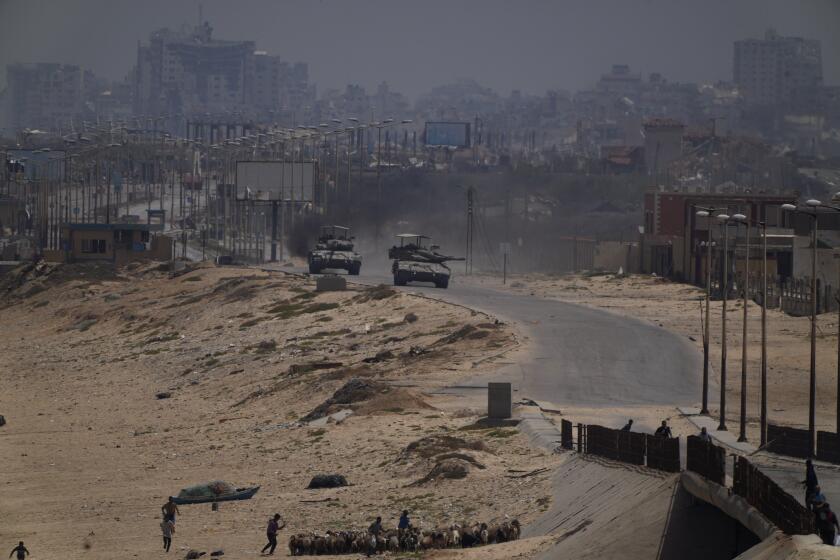Changing Lifestyles : Wartime Survival Skills Stir Chaos in Peacetime : * Used to fending for themselves, the Lebanese are ignoring the government’s attempts to bring back law and order.
Having dealt with the country’s militias, the Lebanese government must now deal with a more formidable obstacle to economic and social revival--the nation’s citizens.
Left to their own devices for 16 years, each Lebanese has become a state within a state. The average family has its own power and water supplies, sends the kids to private schools and tips a garbage man to clean up in front of the house. Lebanese keep their savings accounts in dollars, call abroad on phone lines connected through Cyprus and continue to dream of emigrating to a country where there is a government.
Privatization Lebanese-style surfaced recently as a beautification project on the airport road--where endless kidnapings took place in the past.
The median strip that divides the highway was no more than a litter lane until Khalil Shahrour and his partner spent $4,000 to spiff up the stretch in front of their restaurant. Now the median is a tiny park with grass, flowers and saplings. When asked why they did not wait for the government to do the job, Shahrour responded with a knowing look.
Virtually all Lebanese have outfitted themselves with some alternative to government electricity, which is still provided for only about six hours out of every 24. Thousands of Beirutis have bought into private generator “companies” that provide 12 to 15 hours of power a day for $50 to $75 a month depending on the number of amperes you want. If you miss the due date for a payment--service is billed a month in advance--you have three days before darkness descends.
Meanwhile, the government is still collecting electricity bills from several years ago and hasn’t cut anyone off. When the citizen is asked why he doesn’t pay up and thus enable the government to repair the lines which would mean power for a fraction of the private charges, he says: “Let them give me full power and then I’ll consider paying.”
The reunification of Beirut and the disbanding of militias has allowed residents a wonderful freedom of movement. Unfortunately, the condition of the roads is another infrastructure problem that seems beyond the government.
Pieces of spent munitions protrude menacingly in the middle of roads--partially buried in the pavement since the 1989-90 shelling sprees. With weather and time, holes in the pitted streets have grown to an alarming size.
Manholes long ago lost their covers to “scrap metal dealers” who sold them for $20 each. When the government said the covers were too expensive to replace, residents simply stuffed tires into the open holes as a warning to fellow drivers. Similarly, shell craters have been filled with sandbags no longer needed elsewhere, or with plastic bags full of garbage--whatever is handy.
A flashback to militia days occurred when one well-meaning citizen erected a red flag at a very large hole. The warning was misinterpreted, and motorists came to a screeching halt before realizing that the flag did not mark a militia checkpoint.
A muffler repairman becomes King Midas overnight in Beirut as exhaust systems jar loose along the rough roads. Tire shops are always busy, thanks to those munitions fragments.
During winter months, the holes were camouflaged by rain, and drivers could routinely be seen, halted at the edge of an abyss, estimating its depth and potential danger. But this summer has provided little relief. Leaking sewage pipes send filthy water bubbling to the surface, filling the same holes.
Law and order on the roads is definitely left to motorists. That means there isn’t any. The only speed limit sign in Lebanon is on the campus of the American University of Beirut. The others went the way of the manhole covers. Speed is controlled by speed bumps improvised by residents wherever they feel it necessary--often in front of their homes.
Passing on the autostradas , the word the Lebanese use for four-lane highways, is only slightly less dangerous than being passed. A Norwegian resident of Beirut described the 60-m.p.h. exercise as “the slalom approach to passing.”
A sampling showed that 19 out of 20 drivers fail to use their turn signals--a minor infraction compared to the also common practice of using the oncoming traffic lane to bypass traffic jams.
And why not? The fine for this violation, if caught, is the equivalent of 4 cents. Double-parking--even triple-parking--is punishable by a fine of 3 cents.
Attempts by the police to punish double-parkers by letting air out of their tires deterred Lebanese drivers only briefly. Portable air compressors that work off the car’s cigarette lighter became instantly popular. Parking lots charge 60 cents a day; air compressors cost $30. But to Beirutis outfoxing the government they are worth every penny of it.
Building codes are completely ignored. Lebanese expand and change even rented property at will. Adding floors to an existing building is a moneymaker for landlords. When one owner was told by the original engineer that his building could not safely support two more floors, the landlord simply brought in a new engineer, and it was onward and upward.
An unfinished apartment building that rose too high for the codes stands as one reminder of former government power. The guilty owner tried to sell the incomplete building as a hotel, a school and, finally, a hospital, as the codes allow more floors for such facilities. But because of the war there were no buyers, and today its eight-story frame serves as barracks for Syrian soldiers stationed in Beirut.
One arena where independent-minded citizens confront each other rather than the government is the grocery store.
Citizen importers regularly buy expired goods and relabel them with updated expiration codes. The most-talked-about scandal in Beirut at the moment involves a shipment of frozen meat that originated in Argentina and was refused in turn by Iraq, Iran and Turkey before being bought by a Lebanese importer. A sample examined by the Environmental Health Department of the American University of Beirut led an employee to declare: “I wouldn’t feed it to a dog.” However, the meat is already in circulation and the government has no record of where it went.
Citizen consumers are used to the lack of controls over the quality of meat, however, and tend to laugh off the possibility of disease. “We are immune to these microbes after 16 years of war,” one Beiruti said.
But the seemingly unruly Lebanese are occasionally good for a surprise, as well. Officials report that errant citizens have been showing up at the Income Tax Department to voluntarily pay taxes from as long ago as 1985. The department’s head, Jean Assaf, says he hopes this good will continues, since all its records and computer equipment were burned during civil war battles last year.
Another turn-yourself-in project became popular when militias had to abandon their own judicial systems. Released prisoners surrendered to the police rather than live in fear of personal vendettas.
Could it be that a combination of reformed tax evaders and common criminals will form the base of the new law-abiding citizenry of Lebanon?
More to Read
Start your day right
Sign up for Essential California for news, features and recommendations from the L.A. Times and beyond in your inbox six days a week.
You may occasionally receive promotional content from the Los Angeles Times.






